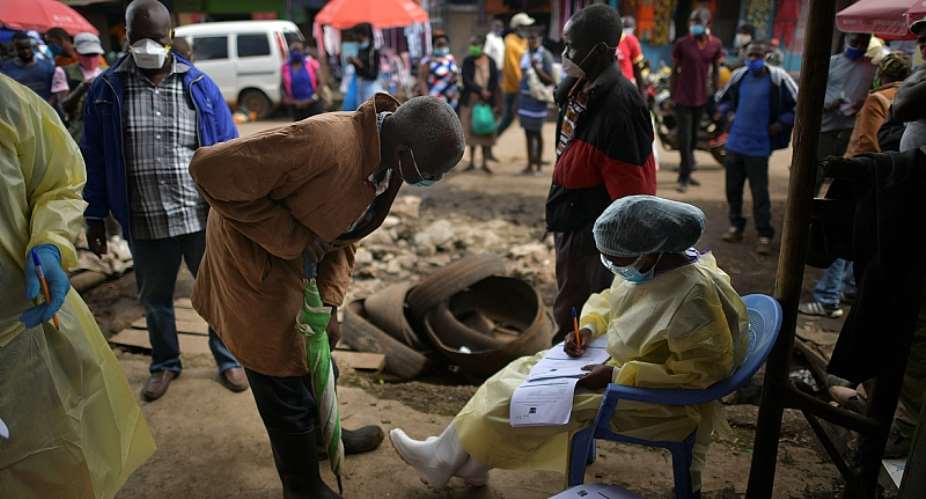Kenya is facing a double burden of communicable and non-communicable diseases. Clustering of infections (such as HIV or TB) and noncommunicable diseases such as diabetes or hypertension is now common. This is putting pressure on the overstretched healthcare system.
In spite of this, many individuals with noncommunicable diseases remain undiagnosed for a number of reasons. These include unfamiliarity with symptoms, lack of testing equipment, and costs associated with the tests.
Recent statistics show that just over half a million adults were living with diabetes in Kenya in 2019. About 40% were unaware of their condition. Deaths from cancer are estimated at 7% while cardiovascular diseases account for 13%.
Overall, almost half of hospital admissions and about 55% of deaths in Kenya are associated with noncommunicable diseases.
This leaves countries like Kenya in a particularly vulnerable position when it comes to the severity of COVID-19. Globally, evidence shows people with underlying medical conditions such as cardiovascular disease, hypertension, diabetes or cancers are at a higher risk of COVID-19.
Is the health system in Kenya prepared?
Even before the COVID-19 pandemic reached Kenya, access to chronic care, especially for noncommunicable diseases, was challenging. This is worse for patients with more than one chronic disease.
Kenya's health system is fragmented and largely designed to manage individual diseases rather than managing patients with multiple diseases. This is partly due to health system challenges such as staff shortages, inadequate or dysfunctional medical equipment, drug stock-outs and unskilled providers.
Unlike HIV, tuberculosis and malaria, access to care for most noncommunicable diseases such as diabetes is a major problem especially among the poor. Findings from our study at Mbagathi district hospital in Nairobi revealed some of these challenges.
A 52-year-old female patient said:
My HIV/AIDS care is provided free of charge but other diseases such as diabetes I pay for.
Another 58-year-old male patient said:
Every time I use KSh.1500 (US$15); consultation fee is KSh.300 ($3); I buy drugs for three months and that costs KSh.300 ($3).
During the COVID-19 pandemic, access to care may be even more difficult due to overwhelmed health systems, lockdown and curfews as well as fear of infections. Currently, preparations are being made to prevent or manage COVID-19 cases. But little is said about protocols to manage patients with chronic conditions.
It's important to strengthen the healthcare system in Kenya to offer integrated care that addresses not only the COVID-19 pandemic but also chronic illnesses.
Recommendations
Management of COVID-19 should take account of other conditions. The current funding such as the $50 million provided by the World Bank should provide horizontal treatment and care. It should address all conditions rather than only prioritising COVID-19 cases.
Integrating care means that individuals could get access to testing and medical care for COVID-19 as well as other conditions such as diabetes or hypertension.
The Kenyan government must also provide healthcare workers with adequate personal protective equipment and address staff shortages by hiring more unemployed doctors and nurses.
And healthcare providers with chronic conditions must be relieved from being at the frontline in managing COVID-19 cases. If this is not possible, providers must be well protected to avoid being infected.
Collaborating with communities and local administrations will help in reporting and tracking cases or deaths, and citizens who defy government laws. Community health workers can sensitise community members and individuals at risk of COVID-19 on preventive measures.
Finally, the police force in Kenya should be made aware that, even during the COVID-19 pandemic, patients with chronic diseases need constant engagement with hospitals. Lockdowns or curfew measures should be sensitive to these populations.
Edna N Bosire does not work for, consult, own shares in or receive funding from any company or organization that would benefit from this article, and has disclosed no relevant affiliations beyond their academic appointment.
By Edna N Bosire, PhD Candidate and Associate Researcher, Developmental Pathways for Health Research Unit (DPHRU)., University of the Witwatersrand





 Dumsor: Don't rush to demand timetable; the problem may be temporary — Atik Moha...
Dumsor: Don't rush to demand timetable; the problem may be temporary — Atik Moha...
 Space X Starlink’s satellite broadband approved in Ghana — NCA
Space X Starlink’s satellite broadband approved in Ghana — NCA
 2024 election will be decided on the grounds of the economy; choice of running m...
2024 election will be decided on the grounds of the economy; choice of running m...
 Dumsor: We're demanding less; just give us a timetable — Kwesi Pratt to ECG
Dumsor: We're demanding less; just give us a timetable — Kwesi Pratt to ECG
 Do I have to apologise for doing my security work, I won’t – Simon Osei-Mensah r...
Do I have to apologise for doing my security work, I won’t – Simon Osei-Mensah r...
 All my businesses have collapsed under Akufo-Addo — NDC Central regional chair
All my businesses have collapsed under Akufo-Addo — NDC Central regional chair
 Military, Prison Officers clash in Bawku, three injured
Military, Prison Officers clash in Bawku, three injured
 GRA-SML contract: MFWA files RTI request demanding KPMG report
GRA-SML contract: MFWA files RTI request demanding KPMG report
 Court threatens to call second accused to testify if NDC's Ofosu Ampofo fails to...
Court threatens to call second accused to testify if NDC's Ofosu Ampofo fails to...
 Family accuses hospital of medical negligence, extortion in death of 17-year-old...
Family accuses hospital of medical negligence, extortion in death of 17-year-old...
